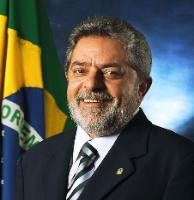Last week, Brazil's President Luiz Inácio Lula da Silva was informally tapped to mediate negotiations between Iran and the West over the Islamic Republic's nuclear program, after Iranian President Mahmoud Ahmadinejad reportedly told his "brother," Venezuelan President Hugo Chávez, that Iran was prepared to accept Brazilian mediation "in principle." The starting point for talks will be the same as last fall's nuclear fuel swap deal, whereby Iran was to ship its enriched uranium to France and Russia for reprocessing, after which the reprocessed fuel would be returned to Iran for use in the Tehran medical reactor.
But while Lula is perceived as among the world's pre-eminent diplomats, in this case he is not an impartial mediator: He firmly opposes further sanctions against Iran.
Part of his rationale grows from Brazil's own checkered nuclear past. In the 1970s and 1980s, Brazil's military government amped up the country's nuclear program to keep pace with similar efforts by its regional rival, Argentina. During this time, Brazil rejected the Nuclear Non-Proliferation Treaty, and refused to address claims that it was pursuing a nuclear weapons capability, despite mounting evidence that it was operating a "parallel" weapons program.

